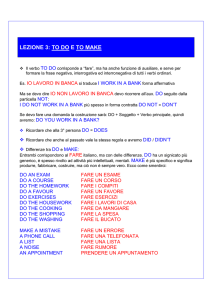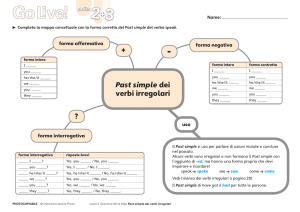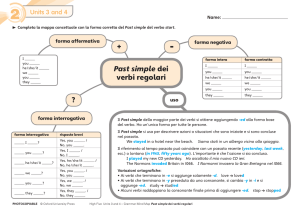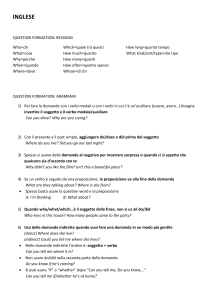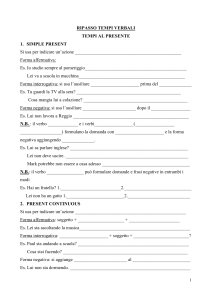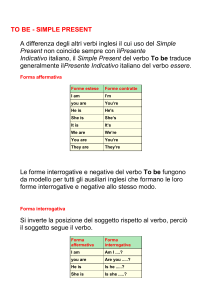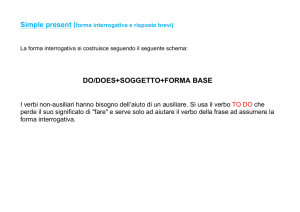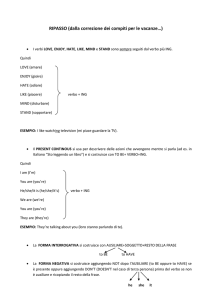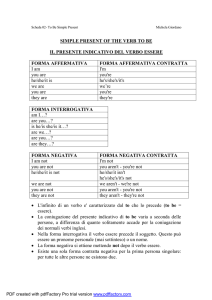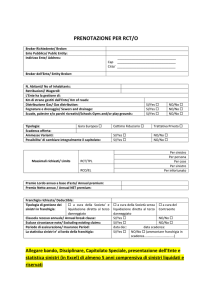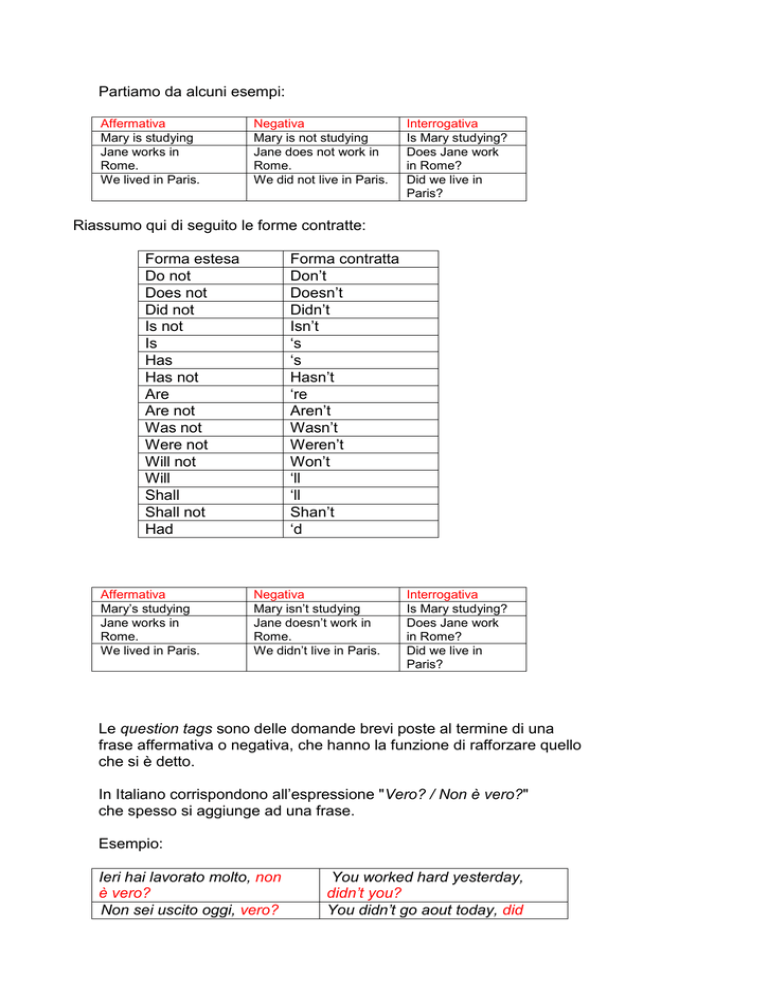
Partiamo da alcuni esempi:
Affermativa
Mary is studying
Jane works in
Rome.
We lived in Paris.
Negativa
Mary is not studying
Jane does not work in
Rome.
We did not live in Paris.
Interrogativa
Is Mary studying?
Does Jane work
in Rome?
Did we live in
Paris?
Riassumo qui di seguito le forme contratte:
Forma estesa
Do not
Does not
Did not
Is not
Is
Has
Has not
Are
Are not
Was not
Were not
Will not
Will
Shall
Shall not
Had
Affermativa
Mary’s studying
Jane works in
Rome.
We lived in Paris.
Forma contratta
Don’t
Doesn’t
Didn’t
Isn’t
‘s
‘s
Hasn’t
‘re
Aren’t
Wasn’t
Weren’t
Won’t
‘ll
‘ll
Shan’t
‘d
Negativa
Mary isn’t studying
Jane doesn’t work in
Rome.
We didn’t live in Paris.
Interrogativa
Is Mary studying?
Does Jane work
in Rome?
Did we live in
Paris?
Le question tags sono delle domande brevi poste al termine di una
frase affermativa o negativa, che hanno la funzione di rafforzare quello
che si è detto.
In Italiano corrispondono all’espressione "Vero? / Non è vero?"
che spesso si aggiunge ad una frase.
Esempio:
Ieri hai lavorato molto, non
è vero?
Non sei uscito oggi, vero?
You worked hard yesterday,
didn’t you?
You didn’t go aout today, did
you?
In Inglese se la frase è affermativa, la question tag va messa in forma
negativa, mentre se la frase è negativa, la question tag va in forma
affermativa.
Le question tag si costruiscono applicando la seguente formula,
qualunque sia il tempo in cui è espresso il verbo.
Frase principale
Regola della question tag
Affermativa (soggetto +
verbo + …)
Ausiliare (have, be, do) +
not + pronome soggetto (un
nome proprio o comune, o
I, you, she …) + ?
Negativa (soggetto +
verbo in forma negativa
+ …)
AUSILIARE + PRONOME
SOGGETTO + ?
Imperativo (verbo + …)
WILL YOU? (perché quando
un “ordine” viene impartito ci si
rivolge a un “tu” o a dei “voi”,
quindi in inglese sarà sempre
“you”)
Esortativo (un “ordine”
che diamo a noi stessi!)
Let’s + verbo
SHALL WE?
Frase con spiegazione
Mary is studying, isn’t
(ausiliare + not) she
(pronome)?
(Mary sta studiando, vero?)
In questo caso nella frase
è presente un ausiliare, is,
perciò nella question tag lo
si ripete, in forma negativa.
Yesterday you worked
hard,didn’t (ausiliare +
not) you (pronome)?
(Ieri hai lavorato molto,
vero?)
Nella frase non c’è un
ausiliare (il verbo
è worked) perciò si usa
l’ausiliare che ci sarebbe
se la frase fosse
interrogativa (did, perché il
verbo è al Simple Past)
You haven’t gone out,
today, have you?
(Oggi non sei uscito,
vero?)
Si ripete lo stesso ausiliare
utilizzato per fare la forma
negativa. Poiché solo gli
ausiliari possono fare la
forma negativa, si ripete
sempre il verbo che nella
frase principale prende il
not.
Close the window, will
you?
(Chiudi la finestra, vuoi?)
In frasi all'imperativo, la
question tag ha lo scopo di
rendere più "polite"
(gentile) l'imperativo.
Let’s study now, shall
we? (Vogliamo studiare
ora?/Studiamo ora, eh?!/
Su! Ora studiamo!)
Nota bene: nelle question tag viene usato come soggetto sempre e solo il pronome
personale
Mary is no here, is she?
John and Albert like coffe, don’t they?
Se il tono della voce "scende" nella question tag, non si tratta di una vera domanda, ma
si invita l'interlocutore ad essere d'accordo:
Mark looks really tired, doesn't he? (Mark sembra veramente stanco, non è vero?)
Yes, he is exhausted! (Sì, è esausto.)
Se il tono della voce sale, si tratta di una vera domanda:
You haven't got time now, have you? (Non hai tempo ora, vero?)
Yes, I have. (Sì, ho tempo.)
Esercizi QUESTION TAGS
1. Completate la frase
1) You aren’t thirsty, ……..?You aren’t thirsty, are you?
2) John is doing his homework, ……..?John is doing his homework, isn’t he?
3) Yesterday it was very hot, ……..? Yesterday it was very hot, wasn’t it?
4) Jack likes chocolate, ……..?Jack likes chocolate, doesn’t he?
5) Peter wasn’t so good in English when he was young, ……..?
6) We all study French at school, ……..?We all study French at school, don’t we?
7) They wanted to eat something before going home, ……..?They wanted to eat something they?
8) She’s going with you, ……..?She’s going with you, isn’t she?
9) Penny’s not waiting for John, ……..?Penny’s not waiting for John, is she?
10) Let’s go to the disco tonight, ……..?Let’s go to the disco tonight, shall we?
2. Scegliere la risposta giusta tra quelle suggerite. Sottolineo la forma verbale alla quale dovete fare
riferimento per la risposta.
1) You went to Sam’s party last night, didn’t you?
Yes • Yes, I did not • Yes, I did.
2) These skirts are really nice, aren’t they?
Yes, they are • No • No, they are.
3) It’s very hot today, isn’t it?
Yes, it was • Yes, it is • Yes, is hot.
4) This is a beautiful house, isn’t it?
Yes, it’s • Yes, this is it • Yes, it is.
5) She can ski, can’t she?
No, she can’t • No, she can • Yes, she can’t.
6) You don’t eat fish, do you?
Yes • Yes, I don’t • No, I don’t.
7) You haven’t met my sister Dawn before, have you?
No, I met her • No, I didn’t • No, I haven’t.
8) George and Claire are staying in a hotel, aren’t they?
Yes • Yes, they are • No, they are.
9) Martha’s not very happy in her new job, is she?
Yes, she isn’t • No, she isn’t • No, she is.
10) This coffee is too strong, isn’t it?
Yes, it is • Yes, it too strong • No, is not.
Se volete chiedere ulteriori spiegazioni, mandatemi una mail. Riunirò le domande e spiegherò nel corso del
prossimo incontro.

